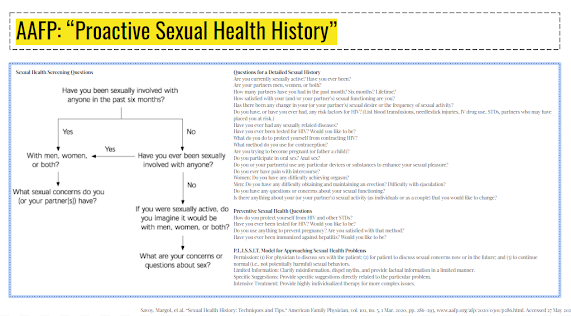Big thanks to Dr. Sophie MacArthur for her excellent presentation on a topic that we could ALL use a little education on-- Sex. And specifically how we talk about it with patients.
The recorded presentation is available HERE.
Link to her slides is HERE.
My notes:
- The Sex Ed most of us had in school wasn't any good
- a meta-analysis of 48 different studies in 10 countries (including US) in BMJ found high school students believed their sex ed to be impractical, out of touch, sexist, heteronormative, and embarrassing
- And. .. let's face it. Physicians aren't very good at talking about sex with patients.
- While 88% of primary care physicians say they take a sexual history, only 25% of charts have said history recorded
- A study from the 1990s-- height of the AIDS epidemic-- found providers didn't take sexual history because they didn't feel it was relevant, didn't feel well-trained, and felt embarassed
- We are inadequately trained
- We tend to discuss sex only when patients ask
- But. . .patients want to talk about sex!
- In one large study from Europe, 91% of patients want their physicians to ask about their sexual history and sexual health
- Even of the 15% who would feel embarrassed talking about sex, 75% still wanted their doctor to ask
- it is not heteronormative
- it allows us to screen people for STIs at appropriate sites (e.g. for rectal, oral GC/CT)
- Permission ("May ask you a few questions about your sexual health and sexual practices?")
- Partners ("Do you have any new partners in the last 12 months? How many? Do your partners have any risk factors?"
- Practices ("When you have sex, what parts of your body come in contact with what parts of someone else? And how?")
- Protection from STIs ("Do you and your partners discuss protection from STIs? "What methods do you use? How often do you use them?")
- Past history STIs ("Have you ever been tested for STIs? Have you ever had an STI?")
- Pregnancy intention ("Do you think you would like to have (more) children some day?")
- Ask routinely, confidentially and free of assumptions
- Do it often (you will get better at it)
- Explain why it's important to know what you are asking
- Ask about function and satisfaction (not just about STI risk)
- Use open ended questions (e.g. "what types of sex do you have?"), at least initially
- Normalize less desired responses (e.g. many people don't consistently use condoms; how often do you find yourself not using a condom?")
- Mirror patient's language if possible
- Make the interaction as natural as possible (not robotic)
- Give patients the option to answer questions indirectly (e.g. I recommend screening for GC/CT in all the sites that may have been exposed; for example, the throat, the anus, the penis, the vagina. Which of these sites should you have tested today?)
- Tone and rapport matter, at least as much as the questions
STIs: Not just condoms - frequent testing, PrEP or PEP, etc.
Contraceptives: RHAP Birth Control Options Fact Sheet; bedsider.org
Consent: Yes, No, Maybe Inventories
Painful sex: Mayo Clinic resources
BDSM/Kink safety: San Francisco Aids Foundation S&M and Kinky Sex Resources; NCSF Kink Aware Professionals Directory
Legal: National Coalition for Sexual Freedom Incident Report; safewordtax.com





This comment has been removed by a blog administrator.
ReplyDeleteThis comment has been removed by a blog administrator.
ReplyDeleteThis comment has been removed by a blog administrator.
ReplyDelete